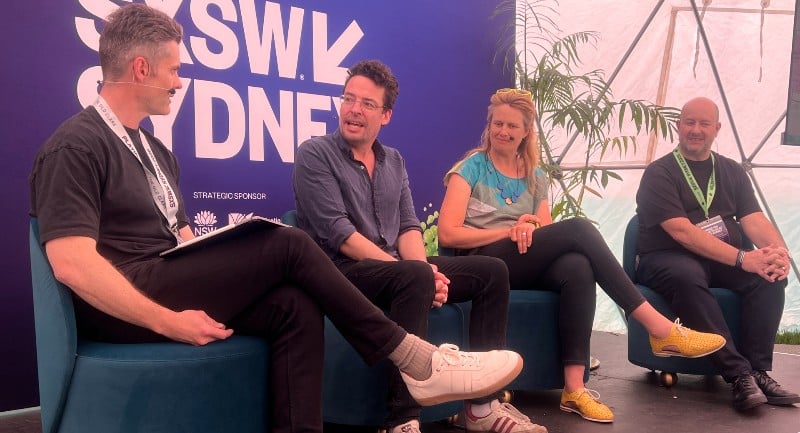If you spend long enough on this planet, you eventually start to feel like you have seen and heard most things before.
There’s that great line from the American author Willa Cather who famously wrote: “There are only two or three human stories, and they go on repeating themselves as fiercely as if they had never happened before”.
This idea was at the heart of a SXSW Sydney panel on Thursday afternoon moderated by James Taylor, Head of Research at The Growth Distillery.
Joining the panel, titled ‘There’s No Such Thing As Unprecedented: How Our Failure To Remember The Past Can Help Us Predict The Future‘ was DEC PR CEO Michael Henderson, UTS Professor of History Anna Clark, and The Daily Telegraph columnist Joe Hildebrand.
The panel was pitched as an exploration into the way people tend to erase past crises from memory and what prompts us all to regularly buy into the cycles of panic and overreaction.
Following the wide-ranging panel discussion, Mediaweek caught up with Taylor to find out what he thought about the issues being raised.
Mediaweek: What’s the value of a discussion like this?
James Taylor: It’s two things. Firstly, through the long history of humanity, basically everything that’s happened has some analogous experience, and it can help us predict how people are going to react to what’s happening in the world today.
Just like we’re talking about a potential AI bubble, we can look at how the dot-com bubble eventuated and how consumers reacted to that.
We can think about the rise of AI as analogous to the rise of the internet, and you can go even further back and say the rise of AI was analogous to the rise of the automobile and to the rise of the aeroplane.
These new technologies change people’s lives, and you can figure out what people are going to do next because of that.
The second thing is that we also need to remember that some people are experiencing change for the first time. So, Gen Z is going through the rise of AI and they haven’t experienced a technological change like this before.
We’ve also got to be mindful and empathetic to everybody and what they are going through.
How important do you think conversations like this are for people to process issues?
There’s a phrase that says how understanding history is the only way you can predict the future, because it’s the only thing we’ve got. So, understanding history is vitally important.
The more decision makers in business, politics, society and the media understand what’s happened in the past, it fully equips them to actually be able to deal with living today.
I think these are some of the most important conversations that people can have.
How important is it to predict the future, versus just taking opportunities presented in the moment?
The future can be tomorrow, or the future can be next month, or next year, or it can be ten or a hundred years from now.
So, when we’re talking about the future, you can take whatever horizon you want. I think it’s important to be able to understand, if we’re talking about AI, then predicting next month is just as important as predicting next year.
In the panel you raised the spectre of the apocalypse. Are we approaching the end of the world?
No. I think one thing we found in our talk today is that predicting the end of the world is something that’s been going on as long as humanity itself.
We can probably feel a little assured that this is our instinct, and instinctually we’ve been wrong every time.
What from the past do you think we need to start re-integrating back into the world?
That’s a good question. I think just knowledge of history… knowledge of what’s going on, knowledge of what our people need to know, because we need to be empathetic to them.
Have we forgotten what people have been through, or do we just not care?
It’s a bit of both, to be honest. It’s difficult to make people care, but when you realise that, it’s actually really interesting. They’ve experienced the same stuff that we’ve experienced, and you can learn a lot through that.
What do we need to take to say goodbye to?
Thinking that we’re going through things for the first time.

